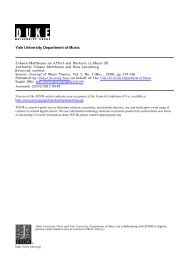Après une Lecture de Liszt: Virtuosity and ... - Free
Après une Lecture de Liszt: Virtuosity and ... - Free
Après une Lecture de Liszt: Virtuosity and ... - Free
You also want an ePaper? Increase the reach of your titles
YUMPU automatically turns print PDFs into web optimized ePapers that Google loves.
19THCENTURYMUSICgenial creativity, he would find himself correctednot only by the words of Goethe but by the works<strong>and</strong> words of the musical masters, namely by Mozarthimself—who reveals a remarkably clear consciousnessof his intentions <strong>and</strong> their execution in hisletters. But principally speaking, this consciousnesscan be nothing other than an artistic consciousness,one that sets out from contemplation [Anschauung]<strong>and</strong> leads to action [Tat]. 36Though he later i<strong>de</strong>alized this progressioninto a “completely integral [einheitsvoll] processof contemplation <strong>and</strong> act,” 37 Marx, likeSchumann, regar<strong>de</strong>d a lack of training as thefirst stumbling block for a ragged composersuch as <strong>Liszt</strong>. Not surprisingly, in 1854 Hanslickcodified the necessity of music training as partof a compositional mo<strong>de</strong>l hostile to virtuosoimprovisation, thereby cementing a paradigmfor composition that would increasingly <strong>de</strong>finethe dominant critical aesthetics of the nineteenthcentury. Schumann, too, seemed sympatheticto this trend in 1848 <strong>and</strong> advised astu<strong>de</strong>nt: “Above all things, persevere in composingmentally, not with the help of the instrument,<strong>and</strong> keep on twisting <strong>and</strong> turning theprincipal melodies about in your head untilyou can say to yourself: ‘Now they will do’.” 38In this view, the authority of historical consciousness<strong>de</strong>feats that of momentary ecstasyin an i<strong>de</strong>alist hierarchy of mind over body: “Thecomposer works slowly <strong>and</strong> intermittently,”Hanslick insisted pace <strong>Liszt</strong>, “forming the musicalartwork . . . for posterity.” 39 Even Wagner,writing to Hanslick about Tannhäuser eightyears earlier, had voiced a similar, historicallyconscious view: “Do not un<strong>de</strong>restimate thepower of reflection; the unconsciously createdwork of art belongs to periods remote from ourown: the work of art of the most advanced36Cited in, <strong>and</strong> adapted from, A. B. Marx, Musical Form inthe Age of Beethoven, trans. Scott Burnham (Cambridge:Cambridge University Press, 1997), p. 19.37Ibid., p. 31.38“Vor Allem beharren Sie dabei, innerlich—nicht mit Hülfe<strong>de</strong>s Instruments—zu erfin<strong>de</strong>n, die melodischen Hauptmotiveim Kopfe so lange zu drehen und zu wen<strong>de</strong>n, bisSie sich sagen können: ‘nun ist es gut’” (Schumann toLudwig Meinardus, 16 September 1848, Dres<strong>de</strong>n, in RobertSchumanns Briefe, ed. Gustav Jansen [2nd edn. Leipzig:Breitkopf <strong>and</strong> Härtel, 1904], p. 289).39Eduard Hanslick, On the Musically Beautiful, trans. an<strong>de</strong>d. Geoffrey Payzant (Indianapolis: Hackett, 1986), p. 49.period of culture can be produced only by aprocess of conscious creation.” 40By following the “outmo<strong>de</strong>d” beliefs ofShelley <strong>and</strong> Schopenhauer, however, <strong>Liszt</strong> inhis early improvisatory fragments <strong>and</strong> free fantasieswould appear—indirectly—to have takenGoethe at his word: Im Anfang war die Tat! 41In a <strong>de</strong>fensive comment on his musical proceduresdating from 1856, <strong>Liszt</strong> explicitly celebratesa musical structure that is sinnlichrather than geistig. Writing to Louis Köhler,who had <strong>de</strong>dicated a treatise on piano playing<strong>and</strong> composition to him, <strong>Liszt</strong> eschews all formalistdogma:However others may judge of these things, [my works]are for me the necessary <strong>de</strong>velopment of my innerexperiences, which have brought me to the convictionthat invention <strong>and</strong> feeling are not so entirelyevil in Art. Certainly you very rightly observe thatthe forms (which are too often changed by quiterespectable people into formulas) “First Subject,Middle Subject, Closing Subject, etc., may very muchgrow into a habit, because they must be so thoroughlynatural, primitive, <strong>and</strong> very easily intelligible.”Without making the slightest objection tothis opinion, I only beg for permission to be allowedto <strong>de</strong>ci<strong>de</strong> upon the forms by the contents, <strong>and</strong> evenshould this permission be withheld from me fromthe si<strong>de</strong> of the most commendable criticism, I shallnonetheless go on in my own mo<strong>de</strong>st way quitecheerfully. After all, in the end it comes principallyto this—what the i<strong>de</strong>as are, <strong>and</strong> how they are carriedout <strong>and</strong> worked up—<strong>and</strong> that leads us always backto the feeling <strong>and</strong> invention, if we would not scramblein the rut of a mere tra<strong>de</strong>. 42The fulcrum on which this comment pivots isthe outward, or let us say readily perceivable,structures of music. In 1856 <strong>Liszt</strong> was thinkingabout these matters in the context of the symphonicpoem: a project of serious composition.But even before this new conception of large-40Wagner to Eduard Hanslick, 1 January 1847, Dres<strong>de</strong>n, inSelected Letters of Richard Wagner, ed. <strong>and</strong> trans. StewartSpencer <strong>and</strong> Barry Millington (New York: W. W. Norton,1988), p. 134.41Goethe’s Faust famously rejects the word, meaning, <strong>and</strong>mental power before stating: “Mir hilft <strong>de</strong>r Geist! Aufeinmal seh’ ich Rat / Und schreibe getrost: Im Anfang wardie Tat” (J. W. von Goethe, Faust, part I).42<strong>Liszt</strong> to Louis Köhler, 9 July 1856, Weimar, in La Mara,Letters of Franz <strong>Liszt</strong>, I, 273–74.62



